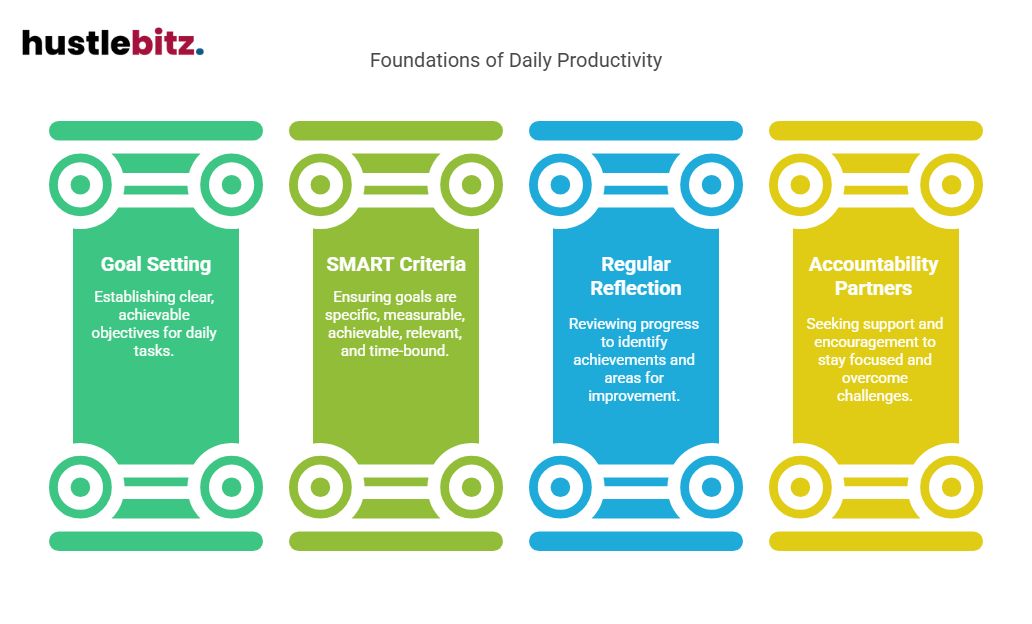Setting daily goals is essential for fostering both productivity and long-term success. These goals serve as specific milestones that enhance time management and keep motivation high. By creating clear, actionable objectives, individuals can draw a direct line between daily tasks and broader aspirations. Utilizing methods such as the SMART criteria and incorporating visualization techniques can reinforce commitment. Regular progress assessments and adaptability to changing circumstances further promote sustained achievement. Engaging accountability partners not only encourages discipline but also provides valuable support. Discover how effective goal-setting strategies can propel you toward your ultimate success.
Key Takeaways
- Daily goals enhance productivity by breaking larger objectives into manageable tasks, fostering a sense of accomplishment.
- Setting clear goals provides direction and motivation, increasing accountability and ownership of actions.
- Utilizing SMART criteria ensures goals are specific, measurable, achievable, relevant, and time-bound for effective planning.
- Regular reflection on progress highlights achievements and areas for improvement, reinforcing commitment to goals.
- Accountability partners offer support and encouragement, helping to overcome obstacles and maintain focus on daily tasks.

Understanding Daily Goals

Daily goals serve as actionable milestones that guide individuals in effectively managing their time and resources to achieve larger objectives. Establishing daily goals is essential for cultivating daily habits that foster productivity and success. By breaking down long-term visions into manageable tasks, individuals can maintain focus and direction in their daily activities.
Implementing motivation techniques, such as goal visualization, helps individuals to mentally picture their achievements, reinforcing their commitment to daily tasks. Additionally, engaging with accountability partners can enhance this process, as they provide support and encouragement, ensuring that one remains disciplined in pursuing these goals.
Time management becomes crucial when setting daily objectives. Allocating specific time slots for tasks can help prevent procrastination and promote self-discipline. A positive mindset plays a significant role, as maintaining an optimistic outlook aids in overcoming challenges that may arise during the pursuit of daily goals.
Incorporating reflection practices at the end of each day allows individuals to assess their progress against success metrics, providing valuable insights into what strategies work best for them. This reflective approach not only reinforces a commitment to daily habits but also highlights areas for improvement.
Benefits of Goal Setting
Establishing clear goals not only enhances daily productivity but also contributes to long-term success by providing a structured framework for personal and professional growth. The benefits of goal setting are multifaceted, significantly impacting various aspects of an individual’s life.
First and foremost, goal setting facilitates motivation enhancement, as having specific targets fosters a sense of purpose and direction. This intrinsic motivation leads to a notable productivity boost, allowing individuals to accomplish more in less time.
Moreover, clarity improvement is a critical advantage of setting goals. When individuals define their objectives, they gain a better understanding of their priorities, which aids in effective time management. This clarity also contributes to stress reduction, as having well-defined goals minimizes uncertainty and enables individuals to navigate their tasks more efficiently.
In addition, regular goal setting increases accountability. When goals are articulated, individuals are more likely to take ownership of their actions, fostering a sense of responsibility for their progress. This accountability, combined with focus sharpening, ensures that efforts are concentrated on what truly matters, enhancing overall performance.
Furthermore, goal setting supports confidence building, as achieving milestones reinforces self-efficacy. As individuals track their achievements, they experience a sense of accomplishment that bolsters their belief in their capabilities.
How to Set Daily Goals
Setting effective daily goals requires a strategic approach that aligns with both short-term tasks and long-term aspirations. Utilizing the SMART criteria—specific, measurable, achievable, relevant, and time-bound—can enhance the clarity and effectiveness of your daily planning. Begin by identifying your short-term objectives that contribute to broader goals, ensuring each task is actionable and time-efficient.
A well-structured approach can be illustrated as follows:
| Task Description | Motivation Techniques | Reflection Practices |
| Identify daily tasks | Visualize success | Review completed tasks |
| Break tasks into steps | Reward system | Assess obstacles faced |
| Set deadlines for tasks | Affirmations | Adjust future goals |
| Collaborate with partners | Accountability partners | Daily journaling |
Incorporating motivation techniques, such as visualization methods, fosters a success mindset, encouraging persistence and focus. Time management plays a crucial role in achieving daily goals; allocating specific time slots for each task allows for better concentration and efficiency.
Moreover, utilizing accountability partners can enhance commitment to your goals. Sharing your objectives with someone can provide the necessary support and encouragement to stay on track. Lastly, engaging in reflection practices at the end of the day not only highlights achievements but also identifies areas for improvement, enabling a continuous cycle of growth. By implementing these strategies, you can set daily goals that pave the way for long-term success.
Prioritizing Your Goals

Prioritizing your goals effectively is essential for maximizing productivity and ensuring that your efforts align with your most important objectives. A well-structured goal hierarchy allows individuals to differentiate between tasks that are urgent and those that are important, facilitating better task prioritization. By distinguishing these categories, you can allocate your time management resources more efficiently, ensuring that critical tasks receive the attention they deserve.
Implementing focus strategies, such as the Eisenhower Matrix, can further enhance your ability to prioritize daily tasks. This method encourages reflection on your goals, helping you to avoid decision fatigue and enabling you to make more informed choices about where to direct your energy. Daily reflection can be a powerful tool, allowing you to assess your progress and adjust your priorities as necessary.
Additionally, collaborating with accountability partners can provide external motivation techniques to help you stay aligned with your goals. These partners can offer insights and feedback, keeping you on track and committed to your daily objectives. Utilizing productivity tools, such as task management apps or planners, can also aid in visualizing your priorities, making it easier to navigate your workload.
Ultimately, the key to successful goal prioritization lies in a disciplined approach to time management and consistent evaluation of your priorities. By embracing these strategies, you can cultivate a productive environment that fosters both personal growth and the achievement of your long-term goals.
Measuring Progress Effectively

Regularly measuring progress is crucial for ensuring that daily goals are being met and aligning efforts with overall objectives. Progress tracking involves monitoring specific activities and behaviors that contribute to goal completion. By establishing clear success metrics, individuals can assess their performance evaluation against set targets, providing a foundation for improvement.
Accountability measures play a vital role in this process, holding individuals responsible for their daily tasks. Implementing feedback loops, where regular reviews of performance occur, fosters an environment of continuous learning and adaptation. This allows for the identification of areas needing adjustment, ensuring that efforts remain aligned with overarching goals.
Milestone assessments are another effective strategy, as they break larger objectives into manageable parts, making it easier to visualize results. By conducting regular productivity analysis, individuals can determine how effectively they are using their time and resources, thereby enhancing time management skills.
Result visualization is essential for maintaining motivation and clarity. Tools such as charts and graphs can provide a visual representation of progress, allowing individuals to see their achievements and areas for growth at a glance. Additionally, achievement reflections, where individuals review their successes and challenges, help reinforce learning and inform future goal-setting.
Overcoming Obstacles and Distractions

Overcoming obstacles and distractions is essential for maintaining focus and ensuring the successful achievement of daily goals. Effective distraction management requires individuals to identify their unique challenges and implement strategies to address them. By utilizing techniques like time blocking, one can allocate specific time slots for tasks, minimizing interruptions and enhancing productivity.
Developing mental resilience is also crucial. It enables individuals to bounce back from setbacks and maintain their focus on the goals at hand. Focus techniques, such as the Pomodoro Technique, can help sustain concentration over prolonged periods. Additionally, motivation strategies, like visualizing success or setting rewards, keep the momentum alive.
Accountability partners play a significant role in overcoming distractions. Sharing your goals with someone can create a sense of responsibility, making it harder to procrastinate. Addressing environmental factors, such as a cluttered workspace, is equally important. A well-organized environment can significantly reduce stress and enhance focus.
To further illustrate strategies for overcoming obstacles, consider the following table:
| Strategy | Description | Benefits |
| Time Blocking | Allocating specific times for tasks | Reduces interruptions |
| Focus Techniques | Methods to maintain concentration | Increases productivity |
| Motivation Strategies | Techniques to boost enthusiasm | Sustains momentum |
| Task Delegation | Assigning tasks to others | Frees up time for priorities |
Adjusting Goals as Needed

Maintaining focus on daily goals is important, but recognizing when to adjust those goals in response to changing circumstances is equally vital for sustained success. A flexible mindset allows individuals to engage in goal reassessment, ensuring that objectives remain relevant and attainable.
As priorities shift, it is essential to adapt strategies that align with these new realities while fostering a culture of learning adaptability. Effective goal adjustment requires responsive planning, which involves evaluating the effectiveness of current goals and identifying areas for improvement.
This process encourages dynamic adjustments that not only accommodate unforeseen challenges but also enhance overall performance. By regularly checking in on progress, individuals can determine if their goals still resonate with their long-term vision, thus maintaining motivation.
When faced with shifting priorities, the ability to pivot becomes critical. Continuous improvement hinges on the willingness to modify goals to better reflect one’s aspirations and circumstances.
By embracing change and remaining open to new opportunities, individuals can transform potential setbacks into stepping stones for growth. Ultimately, adjusting goals as needed is not a sign of failure; rather, it is a strategic approach to achieving greater success.
Final Thoughts
Setting daily goals is a powerful way to stay focused, productive, and on track toward long-term success. By breaking larger objectives into manageable tasks, you create a sense of accomplishment that fuels ongoing motivation. Prioritizing effectively, measuring progress regularly, and adjusting goals when needed ensures that you remain flexible and adaptable in the face of challenges. Accountability, reflection, and a supportive environment are essential for reinforcing these habits. With these strategies, you can consistently work toward your goals with clarity and purpose, enhancing both personal and professional growth.




